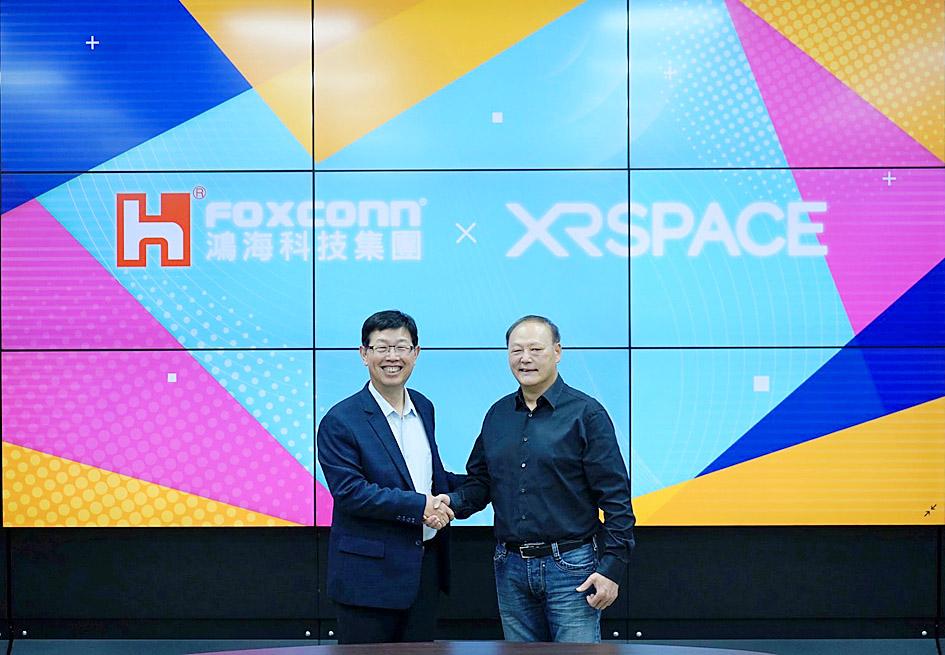Hon Hai Technology Group (鴻海科技集團) yesterday said that it has signed a memorandum of understanding with XRSpace Holding Ltd to make a US$100 million equity investment in the electronics manufacturing service provider’s metaverse technology projects.
As a part of the broader investment, Hon Hai Technology yesterday spent US$15 million subscribing to 28.23 million special shares of XRSpace, it said in a statement submitted to the Taiwan Stock Exchange.
The initial investment would give Hon Hai Technology a roughly 9 percent share of XRSpace, the statement said.

Photo courtesy of Hon Hai Technology Group
Hon Hai Precision Industry Co (鴻海精密), known as Foxconn Technology Group (富士康科技集團) internationally, is a major iPhone assembler and the flagship subsidiary of the group.
“We are thrilled to partner with XRSpace and we envision that this partnership will enhance software technology, delivering a holistic metaverse hardware and software ecosystem,” Hon Hai Precision Industry chairman Young Liu (劉揚偉) said in a joint statement.
“Foxconn’s approach toward the metaverse is the same as that for electric vehicles — we will provide our expertise within the framework rather than solely focusing on the end product,” Liu said.
Founded in 2017, XRSpace is focused on building the metaverse, with features including shareable 3D space, social interaction for user groups or virtual people, and instant 3D interaction across hardware devices, such as virtual reality, augmented reality, mobile phones and tablets.
“This strategic partnership is not just about making our metaverse experiences better and stronger, Foxconn will also help us a lot with global market development,” XRSpace chairman and chief executive officer Peter Chou (周永明) said in the statement.
XRSpace focuses on two anchor metaverse products: PartyOn, a social music metaverse, and GOXR, which enables enterprise and creative industries to create their own metaverse experiences.
The partnership with Hon Hai would enable XRSpace to build the infrastructure needed to make further inroads into the metaverse and continue to optimize its products, the statement said.

To many, Tatu City on the outskirts of Nairobi looks like a success. The first city entirely built by a private company to be operational in east Africa, with about 25,000 people living and working there, it accounts for about two-thirds of all foreign investment in Kenya. Its low-tax status has attracted more than 100 businesses including Heineken, coffee brand Dormans, and the biggest call-center and cold-chain transport firms in the region. However, to some local politicians, Tatu City has looked more like a target for extortion. A parade of governors have demanded land worth millions of dollars in exchange

Hong Kong authorities ramped up sales of the local dollar as the greenback’s slide threatened the foreign-exchange peg. The Hong Kong Monetary Authority (HKMA) sold a record HK$60.5 billion (US$7.8 billion) of the city’s currency, according to an alert sent on its Bloomberg page yesterday in Asia, after it tested the upper end of its trading band. That added to the HK$56.1 billion of sales versus the greenback since Friday. The rapid intervention signals efforts from the city’s authorities to limit the local currency’s moves within its HK$7.75 to HK$7.85 per US dollar trading band. Heavy sales of the local dollar by

Taiwan Semiconductor Manufacturing Co’s (TSMC, 台積電) revenue jumped 48 percent last month, underscoring how electronics firms scrambled to acquire essential components before global tariffs took effect. The main chipmaker for Apple Inc and Nvidia Corp reported monthly sales of NT$349.6 billion (US$11.6 billion). That compares with the average analysts’ estimate for a 38 percent rise in second-quarter revenue. US President Donald Trump’s trade war is prompting economists to retool GDP forecasts worldwide, casting doubt over the outlook for everything from iPhone demand to computing and datacenter construction. However, TSMC — a barometer for global tech spending given its central role in the

An Indonesian animated movie is smashing regional box office records and could be set for wider success as it prepares to open beyond the Southeast Asian archipelago’s silver screens. Jumbo — a film based on the adventures of main character, Don, a large orphaned Indonesian boy facing bullying at school — last month became the highest-grossing Southeast Asian animated film, raking in more than US$8 million. Released at the end of March to coincide with the Eid holidays after the Islamic fasting month of Ramadan, the movie has hit 8 million ticket sales, the third-highest in Indonesian cinema history, Film